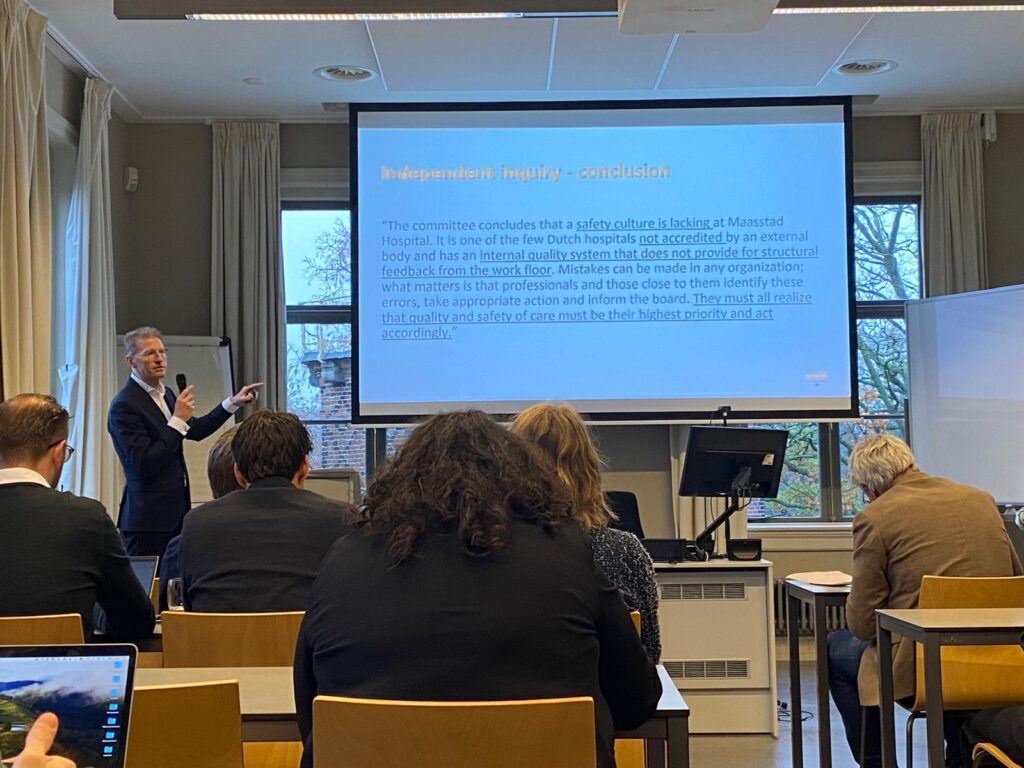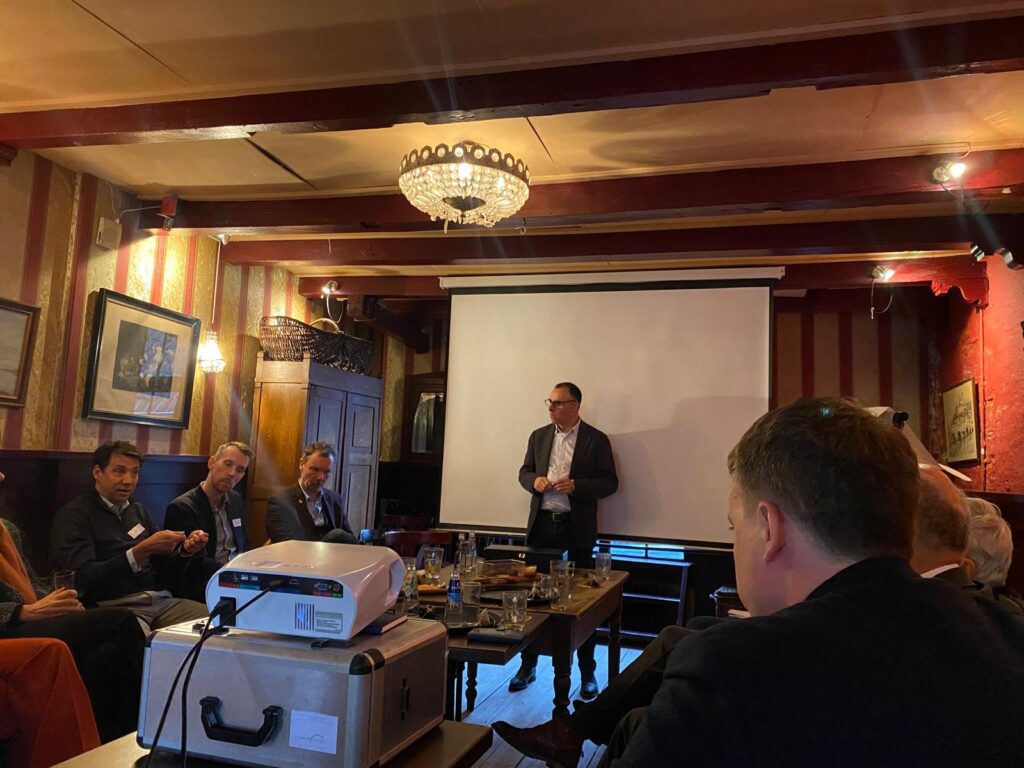2024 Conference
Conference on Crisis Detection
Old Observatory, hortus botanicus & grand cafe de keyzer, leiden, 27 november 2024
The detection of crises is a perennial challenge for policymakers and crisis managers alike. In many policy field and organizations, public and private, people are busy trying to detect emerging crises in time for an effective intervention.
A team of researchers from Leiden University, the Swedish Defense University and Stockholm University are trying to unravel the secrets of timely crisis detection and intervention. This mini-conference was the kick-off event, bringing together researchers and practitioners.
The goal of this conference was two-fold:
- First, we wanted to stimulate research on crisis detection. In many sectors and (policy) organizations, there is a desire to learn how to detect and understand potential crises in an early stage, so that appropriate actions can be taken. All too often, it turns out – in hindsight – that organizations have missed important signals, allowing a crisis to surprise the organization (and its stakeholders). We will present the research project that we will be working on in the coming years.
- Second, we wanted to give the Dutch crisis community a boost by bringing together crisis researchers and practitioners from the crisis field. Fellow researchers presented their work, and we asked practitioners to share how they try to anticipate crises within their organizations.
We kicked the day off with some opening remarks by Magnus Ekengren, who introduced the research program and its main research questions: Why do organisations not act earlier when they see a crisis coming? And how can organisations detect and act on crisis signals? The goal of the research program is to unravel the secrets of early detection and decisive action for the improvement of today’s organizations.
Arjen Boin then presented a first theory of crisis detection. He explained how organisations can unintentionally increase their own harm potential, how blind corners develop, and how other organisations can learn from the principles of high-reliability organisations.
Salma Msahli and Siebe Overdijk applied the theoretical insights from Arjen Boin’s presentation to two case studies: the 2020 Beirut blast and the 2003 heatwave in France. They explained how sloppy management and blind corners led to the authorities missing the crisis and not acting on the crisis.
To end the morning, former minister and current hospital director Sander Dekker presented how the Maasstad Hospital learned from a previous crisis in which the hospital had ignored early signals, underestimated risks, and lacked a safety culture. He explained how the hospital had implemented a safety culture and set up an accurate reporting system, which has led to consecutive golden seal accreditation for safety in the hospital.
The afternoon consisted of three separate break-out sessions. There was a roundtable of practitioners, who discussed common challenges of crisis detection within their organisations. Frits Bloemendaal, Marjolein Baart and Stavros Zouridis from the Dutch Safety Board led a discussion on the fipronil case in the Netherlannds. Young academics presented their research as short pitches to one another. The day ended with a closing ceremony and a borrel at Café Frank.
Thank you to everyone who joined us!
Arjen Boin, Siebe Overdijk & Salma Msahli



Program
| Time | Activity | Speakers | Location |
|---|---|---|---|
| 08:30 – 09:00 | Walk-in | Old Observatory | |
| 09:00 – 09:30 | Introduction to the research program | Magnus Ekengren | Old Observatory |
| 09:30 – 10:15 | Towards a theory of crisis detection | Arjen Boin | Old Observatory |
| 10:15 – 10:45 | Break | Old Observatory | |
| 10:45 – 11:30 | Dissecting a detection case | Salma Msahli Siebe Overdijk | Old Observatory |
| 11:30 – 12:30 | Keynote speech: Detection in hospitals | Sander Dekker | Old Observatory |
| 12:30 – 13:30 | Lunch | Old Observatory | |
| 13:30 – 15:30 (a) | Roundtable practitioners | Hortus Botanicus | |
| 13:30 – 15:30 (b) | OvV-led discussion on the fipronil case | Stavros Zouridis Marjolein Baart Frits Bloemendaal | Café de Keyzer |
| 13:30 – 15:30 (c) | Paper presentations | Jeroen Wolbers Marte Luesink Vittorio Nespeca Thijs van Dooremalen Jori Kalkman Charlotte Boin Lars Brummel Elin Pöllänen | Old Observatory |
| 15:30 – 16:00 | |||
| 16:00 – 17:00 | Closing ceremony – Lessons and future research agenda | Arjen Boin | Old Observatory |
| 17:15 – end | Drinks & bites | Café Frank |
Paper presentations
| Presenter(s) | Title | Topic |
|---|---|---|
| Jeroen Wolbers & Marte Luesink | Crisis foresight: strategies and techniques for moving beyond the heat of the moment | Crisis foresight is a process that facilitates actors to imagine possible futures and consider the future impact of (non)actions to inform decision-making. We argue that crisis foresight can help actors get past the ‘here and now’, using foresight techniques to identify factors that are likely to induce change and anticipate those changes by deciding on robust courses of action |
| Vittorio Nespeca | Learning to connect in action: The emergence of informational boundary spanners in the volatile environment of a crisis | Facilitating inter-group information exchange enhances access to peripheral information that may be novel and relevant, including insights into emerging crises requiring detection. My presentation will focus on examining the emergence of actors, termed informational boundary spanners, who enable effective information exchange across groups, thereby supporting crisis detection |
| Thijs van Dooremalen | Linking crises: how past and present ruptures get interconnected in political debate | In political debate, past crises are often used to make sense of contemporary ones. And, the other way around, newly emerging crises can create a redefinition of earlier ones. I will share some insights on these processes, based on cross-national research concerning the cases of the climate crisis, Covid, and terrorist attacks |
| Jori Kalkman | Sensemaking at the frontline: Testing the limits of crisis detection | Crisis detection requires sensemaking by frontline personnel. This presentation addressess the process and limits of frontline sensemaking by drawing on research on soldiers and USAR personnel. |
| Charlotte Boin | Detecting slow-building threats | Communities across the globe are grappling with slowly building threats that endanger the community’s way of life. Coastal erosion, subsidence and permafrost thaw are just three of the hazards causing living situations to deteriorate; environmental degradation, overfishing and drought threaten livelihoods. In this presentation, I consider how slowly building threats pose unique challenges for detection |
| Lars Brummel | Making sense of crises in multi-level governance systems: A comparative study of federal and unitary states during the Covid-19 pandemic | The structure of multi-level governance (i.e. federalism, decentralization) can influence the capacity of governmental and administrative actors to detect emerging crises, but also to monitor and interpret critical data regarding the evolving dynamics of a crisis. This study employs a comparative public administration perspective to understand the mechanisms of sense-making employed during the Covid-19 pandemic across various multi-level governance systems in Europe, specifically focusing on Belgium, France, Germany, and the Netherlands |
| Elin Pöllänen | Distinguishing between the detection of causes and symptoms of creeping crisis: implications for crisis management action | The Covid-19 pandemic showed the need for improvements in the world’s crisis management capacities, particularly regarding the need for earlier action on the detected warning signals. The paper examines the potential of distinguishing between the detection of underlying drivers and acute symptoms of creeping crises as a way to shift capacities to the former and generate early action and prevention |